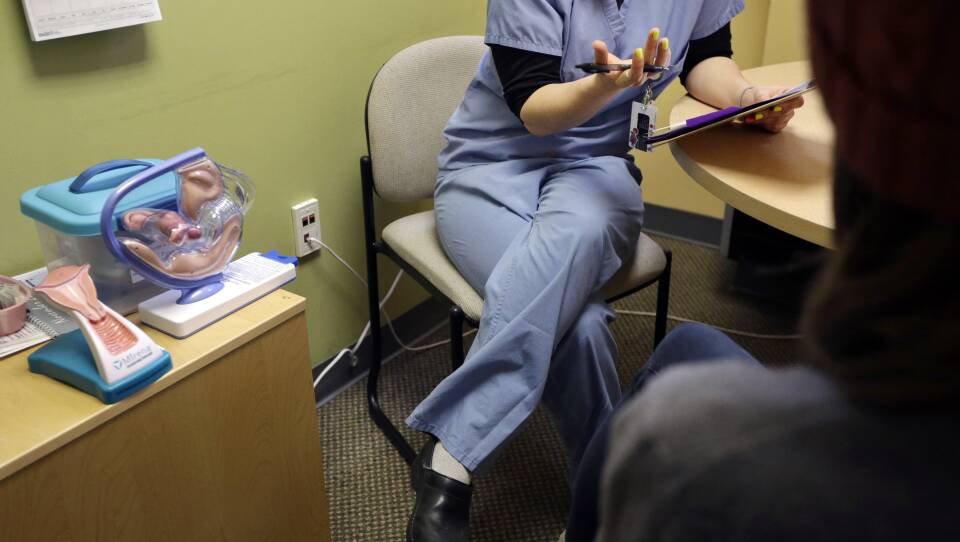One of the largest reproductive health care providers in Massachusetts, Planned Parenthood, is now routinely offering IUD patients the option of being sedated during their appointments.
Intrauterine devices come with many benefits: they last several years, are not permanent, and are one of the most effective forms of birth control. In Massachusetts, IUDs are the third-most common form of birth control, behind condoms and the pill, according to estimates from the Guttmacher Institute.
Still, doctors say that the pain of getting an IUD inserted up through the cervix, or the fear of that pain, has kept many patients away.
“Sometimes you’ll see patients that have canceled or no-showed for several appointments before they finally do come in,” said Dr. Danielle Roncari, Planned Parenthood League of Massachusetts’ chief medical officer. “They’re really telling us that they were really nervous about what they were reading online.”
Patients who request in advance the moderate sedation option at Planned Parenthood will stay awake during the procedure, but they’ll receive a pain medication and an anti-anxiety medication fed through an IV drip. Afterwards, they will be required to spend 30 minutes under observation in a recovery room and won’t be allowed to drive themselves home.
Many providers don’t offer sedation on site. The common suggestion is taking over-the-counter pain relief like acetaminophen or ibuprofen ahead of an appointment.
Experts at Planned Parenthood and elsewhere say that offering sedation for IUDs allows them more options to respond to a patient’s individual needs rather than taking a one-size-fits-all approach.
Several years ago, Roncari said, they started offering a local anesthetic to numb the cervix.
“But some patients really did express that they needed more than that,” she said. “We thought that this was really a good opportunity to listen to what our patients needed and to take that next step.”
This new level of sedation currently accounts for just a fraction of IUD insertions and removals at Planned Parenthood. Since February, when Planned Parenthood began offering moderate sedation, fewer than 50 IUD insertions and/or removals have been performed with the new option. The Massachusetts offices typically perform about 200 IUD procedures each month. But Roncari says interest has been “exponentially” growing among patients as they’ve made more appointments available.
Pimpisa Lorprapan, who’s getting her MBA at Boston College, was one of those patients. She wanted an IUD before graduating and returning home to Bangkok, but grew concerned after reading online that some people faint from the pain. Then she learned about Planned Parenthood’s new option from Reddit.
Lorprapan told GBH News she’s glad she opted for the sedation since she had a difficult time recovering from the procedure.
“That night was rough,” Lorprapan said. “It was very hard on me, to be honest. And I think if I had to go through that during the insertion procedure, it would have been much worse.”
Marin Carroll, a web developer who lives in Newton, got her first IUD about eight years ago.
“It was brief and the recovery was fine — but like the actual moment, even though it was only for a few seconds, was very painful,” she said. “And I don’t have a very high pain tolerance, either.”
This spring, Carroll knew she’d need to both get her current IUD removed and get a new one inserted, so she looked for sedation options to help through the longer process.
“People were making sure I felt safe the entire time,” Carroll said, recalling the process while she was under sedation. “I was able to hold a conversation with them the entire time.”
Carroll also appreciated staff taking care of her when she began fainting in the recovery room after the procedure.
Other providers can also help patients seeking sedation for IUDs, including major hospital systems. At Boston Medical Center’s procedure unit, where Dr. Rachel Cannon is the medical director, IUDs are often inserted and removed with moderate or deep sedation. (Her unit performed nearly 1,800 total insertions and removals in 2022.)
She says some of her patients routinely go to BMC for their medical care, but many are referred from local health centers who know that their hospital system offers sedation as an option.
Cannon encourages people interested in IUDs to talk to their providers about sedation.
“Even if a provider can’t do it themselves — like, they don’t have the resources — they can usually refer,” she said. “We’re not in the business of traumatizing people, and so if there is another option and a patient is willing to wait, I think it’s super appropriate.
“I feel very encouraged that we’re all having this conversation and we’re really thinking about, better pain control for GYN procedures, in general, because I think it is really important,” she added. “We have tolerated it, I think, a long time ... and I think we’re coming into a better era of having more appropriate pain control options.”
For Planned Parenthood, what started as a pilot at their Boston location in February is now also available at their facilities in Worcester and Springfield.
“Pain is so different depending on the patient,” Roncari said. “It’s something we wanted to offer to let patients really be able to make the choice as to what works best for them.”









